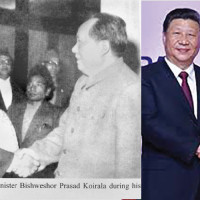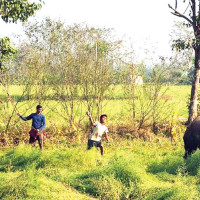- Saturday, 2 August 2025
Silent Body, Screaming Soul
What happens when the body revolts against the self? When something you once cherished or passionately loved suddenly becomes what you now consciously resist? And no matter what, not even death could stop your rebellion?
Well, in this quiet but unrelenting defiance, it is here that 'The Vegetarian' takes root; a rebellion so tender, so brutal, it blooms and withers all at once. The Vegetarian, first published in 2007 in the Korean language, was penned by Han Kang, the 2024 Nobel Prize winner in Literature. The author has crafted the novel with her distinct prose. And I must admit, with her magnificent translation, Deborah Smith has preserved the soul of the original with breathtaking artistry. Though the term 'vegetarian' is significant in the novel, it is not a story about vegetarianism.
The story starts with an intriguing line: "Before my wife turned vegetarian, I'd always thought of her as completely unremarkable in every way."
We explore the life of Yeong-hye, the book's protagonist, who suddenly turns vegetarian, through three different lenses. The first one—also the first part of the story, titled 'Vegetarian'—is from her husband Cheong's lens. Conversely, the second is from her unnamed brother-in-law, 'Mongolian Mark'. And the last part is from her older sister, In-hye's lens, titled 'Flaming Trees'. The husband's perspective in part one is in first person, while the other two are in third-person narration.
Yeong-hye is a woman in her mid-thirties living with her husband in modern-day Seoul, South Korea. She is one of three siblings, with her older sister being the only family member interested in her life. Yeong-hye's husband treats her as merely a body that exists to serve him. Whether through labour or flesh, she is meant to fulfil his needs.
"I had a dream," she says to her husband, but he never explores her dream. She dreams of death and gore, of flesh and blood, and decides to turn vegetarian. She completely detaches herself from meat, neither eating nor cooking meat for her husband. He becomes so frustrated with her weird behaviour and the complete detachment from normalcy that he complains about her to her mother, who, like him, dehumanises Yeong-hye—seeing her either as a disgrace to the family or an inconvenient maid to her husband.
Yeong-hye went without eating meat for months. Because of this, her body begins to resemble a cancer patient's: pale, gaunt, and fragile. Her father, who once served in the Vietnam War, rages when he discovers about her daughter's rejection of meat. On a family get-together visit, Yeong-hye's father, with his cold military tone, orders his daughter to eat the meat, but she refuses. Her father, with fury, forces a piece of meat into her mouth. Yeong-hye spits it out, and an animal cry of distress bursts from her lips. She then cuts her wrist with the fruit knife. Her family admits her to a hospital.
Yeong-hye becomes frustratingly strange to her husband and a disgrace to her family there, too. One morning, her husband finds her naked on a bench by the fountain, her private parts completely exposed to strangers. Cheong can no longer endure the weirdness and the strange rebelliousness of his wife. He detaches himself from her forever.
The unnamed brother-in-law, a video artist, is sexually attracted to Yeong-hye. The Mongolian Mark on her buttocks, which he had heard from his wife, In-hye, intrigues him, inspiring him to work on his flowery-painted sketches. And when he visits Yeong-Hye after two years of her divorce, he finds her naked in her room and sees that Mongolian mark on her buttocks. How has it still not disappeared? He, staring at it with deepening awe, questions within his mind.
Instead of seeing her as unremarkable, he views her as ethereal. He is bewitched by her wasting away. Her body—the Mongolian mark, her breasts, thighs, buttocks, and her visible ribs—everything fuels his egotistical artistic desires. When her brother-in-law paints flowers on her body, she doesn't want to remove them. She says that those flowers help her and that they stop the nightmares she often has.
When he tries to force himself on her, she resists—not because she rejects intimacy, but because she wants something else. She wants him painted, too. It's not about people. In her mind, it's flowers mingling with flowers. No flesh, no personhood.
Yeong-hye is drawn to plants, particularly trees. She wants to become one. It's all complex: the dreams, the detachment, the desire to become a tree. It is only in the last chapter that we get to know that Yeong-he is a victim of anorexia nervosa and schizophrenia. Only after this revelation do the dreams, the strangeness, and the rebelliousness subtly paint the picture clearly.
When her sister, In-hye, finds her husband in Yeong-hye's bed, naked. She feels disgusted towards her husband about the act. She sends her husband to jail, enduring everything: her sister's weakening body, her son's fatherless life, and her own crumbling body. She admits Yeong-hye to a mental hospital.
The world has always been unkind to Yeong-hye, except for her older sister, In-hye. In-hye was always there for her. The hospital meant to care for Yeong-hye is brutal, heartless, and cruel. They force-feed her, tranquillise her, and restrain her. When In-hye finds out about this and protests, they clear their hatred.
During an unaccompanied walk for patients, Yeong-hye wanders into the forest. She hears the call of the trees. She had chosen to become a tree and now feels like she has become one. She feels her transformation is complete. Free from society, unbound by flesh, unmoving, powerful.
The last part, through the eyes of In-hye, is littered with flashbacks and guilt. We also get to delve into the life of young Yeong-hye. In-Hye also regrets the marriages, choosing the wrong man, and the effect her depression has on her son. She even dismisses her resilience and hard work as mere cowardice, blind compliance with her parents' rigid expectations. Ultimately, her assessment is correct: she is another version of Yeong-hye, suffering the same wounds, the same trauma, and the same dehumanisation.
The novel is a must-read. It is poured out psychologically, emotionally, and, of course, artistically. You'll find yourself under its magic with a lot of mixed feelings.
(The author is an intern at The Rising Nepal.)

















